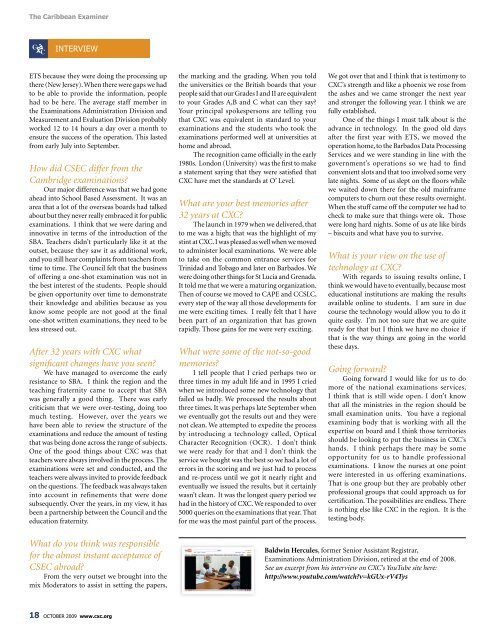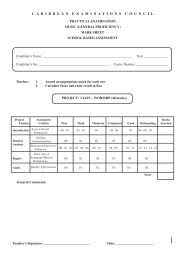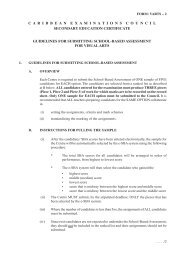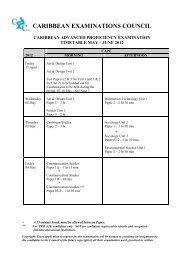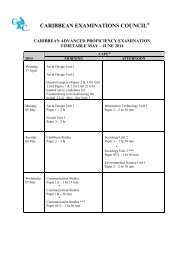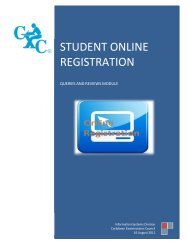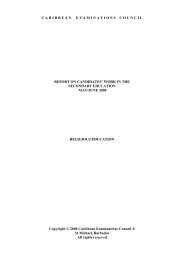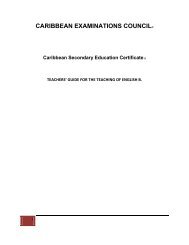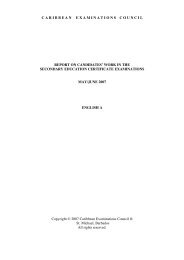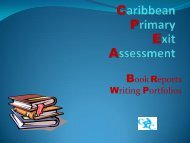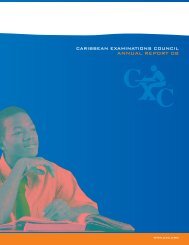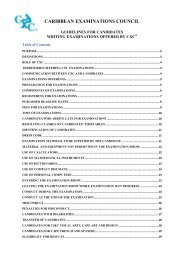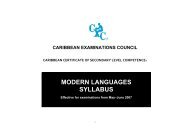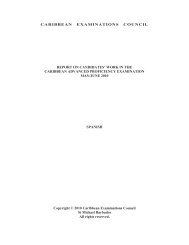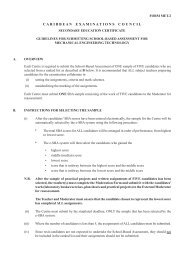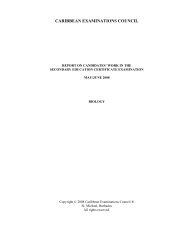Caribbean Examinations Council
Caribbean Examinations Council
Caribbean Examinations Council
Create successful ePaper yourself
Turn your PDF publications into a flip-book with our unique Google optimized e-Paper software.
The <strong>Caribbean</strong> Examiner<br />
INTERVIEW<br />
ETS because they were doing the processing up<br />
there (New Jersey). When there were gaps we had<br />
to be able to provide the information, people<br />
had to be here. The average staff member in<br />
the <strong>Examinations</strong> Administration Division and<br />
Measurement and Evaluation Division probably<br />
worked 12 to 14 hours a day over a month to<br />
ensure the success of the operation. This lasted<br />
from early July into September.<br />
How did CSEC differ from the<br />
Cambridge examinations?<br />
Our major difference was that we had gone<br />
ahead into School Based Assessment. It was an<br />
area that a lot of the overseas boards had talked<br />
about but they never really embraced it for public<br />
examinations. I think that we were daring and<br />
innovative in terms of the introduction of the<br />
SBA. Teachers didn’t particularly like it at the<br />
outset, because they saw it as additional work,<br />
and you still hear complaints from teachers from<br />
time to time. The <strong>Council</strong> felt that the business<br />
of offering a one-shot examination was not in<br />
the best interest of the students. People should<br />
be given opportunity over time to demonstrate<br />
their knowledge and abilities because as you<br />
know some people are not good at the final<br />
one-shot written examinations, they need to be<br />
less stressed out.<br />
After 32 years with CXC what<br />
significant changes have you seen?<br />
We have managed to overcome the early<br />
resistance to SBA. I think the region and the<br />
teaching fraternity came to accept that SBA<br />
was generally a good thing. There was early<br />
criticism that we were over-testing, doing too<br />
much testing. However, over the years we<br />
have been able to review the structure of the<br />
examinations and reduce the amount of testing<br />
that was being done across the range of subjects.<br />
One of the good things about CXC was that<br />
teachers were always involved in the process. The<br />
examinations were set and conducted, and the<br />
teachers were always invited to provide feedback<br />
on the questions. The feedback was always taken<br />
into account in refinements that were done<br />
subsequently. Over the years, in my view, it has<br />
been a partnership between the <strong>Council</strong> and the<br />
education fraternity.<br />
the marking and the grading. When you told<br />
the universities or the British boards that your<br />
people said that our Grades I and II are equivalent<br />
to your Grades A,B and C what can they say?<br />
Your principal spokespersons are telling you<br />
that CXC was equivalent in standard to your<br />
examinations and the students who took the<br />
examinations performed well at universities at<br />
home and abroad.<br />
The recognition came officially in the early<br />
1980s. London (University) was the first to make<br />
a statement saying that they were satisfied that<br />
CXC have met the standards at O’ Level.<br />
What are your best memories after<br />
32 years at CXC?<br />
The launch in 1979 when we delivered, that<br />
to me was a high; that was the highlight of my<br />
stint at CXC. I was pleased as well when we moved<br />
to administer local examinations. We were able<br />
to take on the common entrance services for<br />
Trinidad and Tobago and later on Barbados. We<br />
were doing other things for St Lucia and Grenada.<br />
It told me that we were a maturing organization.<br />
Then of course we moved to CAPE and CCSLC,<br />
every step of the way all those developments for<br />
me were exciting times. I really felt that I have<br />
been part of an organization that has grown<br />
rapidly. Those gains for me were very exciting.<br />
What were some of the not-so-good<br />
memories?<br />
I tell people that I cried perhaps two or<br />
three times in my adult life and in 1995 I cried<br />
when we introduced some new technology that<br />
failed us badly. We processed the results about<br />
three times. It was perhaps late September when<br />
we eventually got the results out and they were<br />
not clean. We attempted to expedite the process<br />
by introducing a technology called, Optical<br />
Character Recognition (OCR). I don’t think<br />
we were ready for that and I don’t think the<br />
service we bought was the best so we had a lot of<br />
errors in the scoring and we just had to process<br />
and re-process until we got it nearly right and<br />
eventually we issued the results, but it certainly<br />
wasn’t clean. It was the longest query period we<br />
had in the history of CXC. We responded to over<br />
5000 queries on the examinations that year. That<br />
for me was the most painful part of the process.<br />
We got over that and I think that is testimony to<br />
CXC’s strength and like a phoenix we rose from<br />
the ashes and we came stronger the next year<br />
and stronger the following year. I think we are<br />
fully established.<br />
One of the things I must talk about is the<br />
advance in technology. In the good old days<br />
after the first year with ETS, we moved the<br />
operation home, to the Barbados Data Processing<br />
Services and we were standing in line with the<br />
government’s operations so we had to find<br />
convenient slots and that too involved some very<br />
late nights. Some of us slept on the floors while<br />
we waited down there for the old mainframe<br />
computers to churn out these results overnight.<br />
When the stuff came off the computer we had to<br />
check to make sure that things were ok. Those<br />
were long hard nights. Some of us ate like birds<br />
– biscuits and what have you to survive.<br />
What is your view on the use of<br />
technology at CXC?<br />
With regards to issuing results online, I<br />
think we would have to eventually, because most<br />
educational institutions are making the results<br />
available online to students. I am sure in due<br />
course the technology would allow you to do it<br />
quite easily. I’m not too sure that we are quite<br />
ready for that but I think we have no choice if<br />
that is the way things are going in the world<br />
these days.<br />
Going forward?<br />
Going forward I would like for us to do<br />
more of the national examinations services,<br />
I think that is still wide open. I don’t know<br />
that all the ministries in the region should be<br />
small examination units. You have a regional<br />
examining body that is working with all the<br />
expertise on board and I think those territories<br />
should be looking to put the business in CXC’s<br />
hands. I think perhaps there may be some<br />
opportunity for us to handle professional<br />
examinations. I know the nurses at one point<br />
were interested in us offering examinations.<br />
That is one group but they are probably other<br />
professional groups that could approach us for<br />
certification. The possibilities are endless. There<br />
is nothing else like CXC in the region. It is the<br />
testing body.<br />
What do you think was responsible<br />
for the almost instant acceptance of<br />
CSEC abroad?<br />
From the very outset we brought into the<br />
mix Moderators to assist in setting the papers,<br />
Baldwin Hercules, former Senior Assistant Registrar,<br />
<strong>Examinations</strong> Administration Division, retired at the end of 2008.<br />
See an excerpt from his interview on CXC’s YouTube site here:<br />
http://www.youtube.com/watch?v=kGUx-rV4Tys<br />
18 OCTOBER 2009 www.cxc.org


